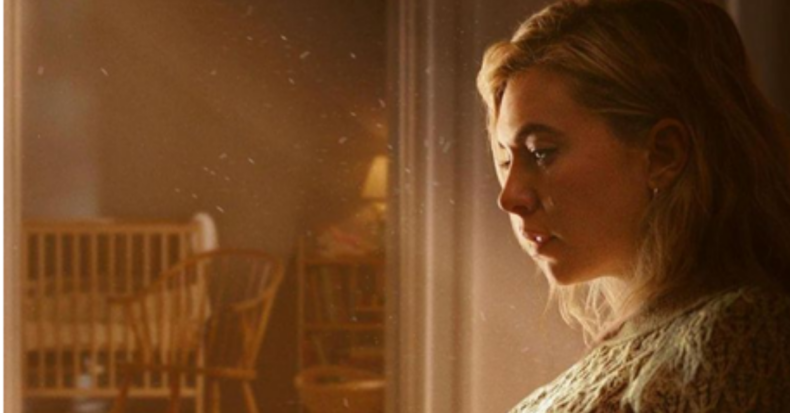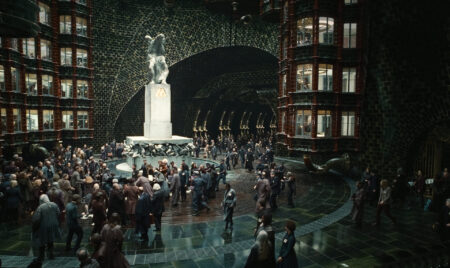Documentation of grief and loss suffered by a woman and how she picks her pieces, glueing them together, is what the movie offers.
Venessa Kirby’s rewarding performance as a mother who silently accepts and endures her pain stuns everyone.
Opening with a great, terrifying and most gripping prologue that one has seen recently, Pieces of a Woman initially appears to be a well-executed film that is destined to achieve great things.
However, Kornél Mundruczó’ s great exposure to loss, and mental trauma cannot penetrate deep into the audience’s minds and hearts.
The exceptional opening sequence
The director opens his film with a one-take prologue followed by a sequence of home-birth in real-time.
Martha, portrayed by Venessa Kirby, is seen with her husband Sean (Shia LaBeouf) as she goes into labour, and he tries to comfort her with a few dad jokes.
The midwife (Molly Parker) is replaced last minute, creating tension, but she reassures her of safety time and again.
The inconsistent shots stretch time between the writhing, belching and bellowing, shrinking the gap between Kirby and the audience.
In 30 nail-biting minutes, the audience witness a helpless Martha and Sean go on a rollercoaster of emotions which range from great excitement to sheer terror as the baby begins to show signs of discomfort on its way into the world.
The tiny heartbeat that filled the room a few minutes ago now disappears as the scene unfolds at present as the horror-stricken parents await the arrival of paramedics.
What follows
After the opening act is complete, the movie begins to deflate in its grandeur and artistry. The film’s remainder could do much more than just painting a disintegrating marital relationship after the tragedy.
Martha internalises her grief which results in people surrounding her, including her partner, making harsh judgments.
How differently men and women tackle suffering is shown by the film quite well. Martha’s inward suppression of sorrow and Sean’s outward aggression conflict in several scenes as the two grow detached by every passing moment.
The father falls back to alcohol consumption, which he was recovering from, and Martha’s disinterest in physical intimacy causes him to become an unstable time bomb — ready to explode anytime.
On the other hand, the mother goes back to work to keep herself busy and think it would help her move on.
However, her body, which was the vessel for maternal wish to be fulfilled, is left behind as a reminder of the failure. The once certain future, now, seems bleak, and it creates a void inside her.
A mother judging another mother
The loss that Martha suffers cannot be understood by anybody around her, not even Sean. The way she deals with it, therefore, becomes bizarre for the rest.
When Martha decides to donate her baby’s body for a scientific study, she is judged by her mother, Elizabeth (Ellen Burstyn), who admonishes her ways of dealing with grief.
Elizabeth wants her daughter to take legal action against the midwife, which the daughter does not wish.
The conflict between the pair reaches a point of no return at a family lunch. What started as a casual conversation between Elizabeth and Martha regarding The White Stripes turned into a fiery argument,
With Elizabeth delivering a heated monologue about how she dealt with her tragedy and advised her daughter to do it as well.
The way she judges Martha about fighting her demons portrays as if there is only a particular way to deal with grief.
Final Comments
The movie is rewarding only when Kirby is the emotional centre of gravity. When the point of view changes to Sean’s grief or Eve’s trial, it becomes unappealing.
Kirby’s portrayal of a struggling mother with a blank face forms the playground of emotions makes the unimaginable loss more realistic and theatrical.
The director has used recurring metaphors as well. For instance, Sean, who builds bridges, cannot bridge the widening gulf between him and his partner and the apples and seeds that refer to Martha’s rebirth.
The authenticity and honesty that we see in the first scene struggle to stay alive, depicting a mother trying to free herself from heart-wrenching sorrow and grief.
If the movie was solely based on Martha and her ways of dealing with pain, instead of getting distracted with peripheral dramas, it might have a chance to be nominated at the Oscars as one of the best films in recent history.













